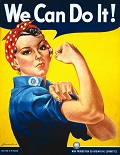Energy and Equality
Last week two leaders in business and politics spoke out about an issue that I care very much about: gender equality.
Gender equality
Warren Buffet eloquently wrote about how, from a business perspective, women are an incredibly valuable yet underutilized resource. Chief executive officer of Foreign Policy David Rothkopf went a step further and quantified the problem. In the publication's annual "Power Map" he correctly points out that "the most disturbing aspect of the list is that only 10 percent of the people on it are women." Both men make the point that the lack of representation of women in leadership positions in the United States is bad for business and is intrinsically undemocratic. I highly recommend reading both articles.

Rothkopf
Despite major strides made in the 1960s and 70s in civil rights and women's liberation, by the 1990s progress in this arena had essentially flat lined, and even moved backwards by some measures. Many people seem to think that this lack of progress is rooted in the fact that the movement succeeded-that women have equal rights and the fight is over. However, the numbers tell a completely different story.
In the United States, women are largely absent from leadership and decision-making positions. Pay inequality is wide spread and well documented. We are decades behind other developed countries in terms of maternity leave and childcare benefits, making it systematically harder for women who choose to have children to achieve and retain high-level jobs. We should not accept the status quo as good enough-because it's really not very good. The vast majority of Americans self report that we want gender equality in our own lives and careers-but we need to be doing more to create that reality.
Women and nuclear energy
We in the energy industry need to pay special attention to issues of inequality. Access to abundant energy and electricity have proven to be one of the most successful tools in reducing poverty, creating opportunity and increasing quality of life. Energy's contribution to prosperity and equality are perhaps our most compelling selling point. Nuclear energy has these benefits along with being one of the safest and most environmentally responsible energy sources-all issues we know that women in particular care a great deal about.
However, we also know to whatever extent that the nuclear industry has a "bad reputation," and the reason lies squarely in our failure to connect with women, who are the primary decision makers about energy use in most American homes. Women oppose nuclear energy at nearly double the rate of men. As a woman, it is hard for me to not see the connections between gender inequality in Science Technology Engineering and Math (STEM) careers, the lack of women in leadership positions, and the gender gap in support for nuclear energy. I also realize that these connections may not be as obvious to others, which is why I feel the need to properly acknowledge and address the ways that gender inequality plays into energy issues, as well as how this issue will likely unfold in the future.
The Century of Women-and a crash course
As a person who follows pop culture and sociology almost as closely as I follow energy issues, there are many indicators that the issue of gender equality is about to get really big. Tom Brokaw is literally calling this the "Century of Women." Being ahead of the curve on this will pay dividends. I see the inherent opportunities in our changing cultural understanding of gender and I want the nuclear sector to successfully seize these opportunities-so here is a crash course in navigating the language and etiquette of social justice as it applies to gender issues:
- Feminism means supporting equal rights for both genders. It does not mean women want to take away men's power. It's a "growing the pie" situation-we want you to keep your power and influence, and we want to also have power and influence. Feminism is not a dirty word.
- Do not imply that women's issues are somehow women's responsibility to manage. Women's issues are everyone's issues and everyone's responsibility. We are half of the population-not a special interest group.
- If you are a man talking about gender with a woman-you should be an active listener-do not make assumptions about her experiences. If you are not sure what to say, then just ask questions and listen. It's okay if you feel a little uncomfortable-it can be hard to hear, some of this stuff.
- It takes a great deal of courage to speak up about experiencing gender inequality-be compassionate to that fact. Do not, I repeat DO NOT, under any circumstances say, tell or otherwise imply that a woman is not a valid witness to her own life. She is. And she should be treated like she is.
- If a woman experiences sexist behaviors or remarks and tells you about it-do not make excuses for the person who has offended her. Do not imply that it is okay because said person has been to your house for dinner or is very talented. This is essentially asking a victim to show compassion toward her abuser and is Not. Cool. At. All. Don't be a victim blamer.
- Please do not use the phrase "feminist agenda." It's 2013. It's called gender equality. And it is still a very real problem, not some made up conspiracy theory.
- If you are a man speaking to a woman about gender issues, please do not start going on about reverse discrimination or how having a wife/daughter/mother makes you more knowledgeable about women's experiences than being an actual women. Refocusing the dialogue on yourself is insensitive and inappropriate, and ultimately part of the problem.
- If you are a man and you witness sexist behavior or language-speak up. Hold yourself, your friends, and colleagues to high standards on this issue. This change is happening, so go ahead and start participating like Buffet and Rothkopf. Few things are more powerful in creating change than social pressure.
Nuclear and social justice
On an industry level, it would be wise of our leaders to set ambitious goals for hiring and retaining more women. Monitor and correct for gender pay gaps-do it actively and loudly. Support STEM outreach for girls, provide excellent maternity and childcare benefits, and create internal mentorship programs for getting women into leadership positions. Supporting families through these types of benefits improves productivity and strengthens employee commitment to their jobs for men and women alike. We should actively align the goals of the nuclear sector with gender equality. This is the direction the world is going in and if we fail to adapt as an industry, we will also fail to be a leading energy source of the future.
 Thinking that women just need to toughen up to make it in this industry, or in other high impact careers, isn't enough-we need to update our understanding of gender issues and get comfortable with the language of social justice. It may be a tough subject, and it may be uncomfortable-but it is an absolutely necessary step and it's well past time.
Thinking that women just need to toughen up to make it in this industry, or in other high impact careers, isn't enough-we need to update our understanding of gender issues and get comfortable with the language of social justice. It may be a tough subject, and it may be uncomfortable-but it is an absolutely necessary step and it's well past time.
A special thanks to sociologist Elizabeth Culatta, whose support and expertise were essential in researching and editing this piece.
___________________________
 Suzy Baker is currently traveling through Europe and reporting on her experiences at Diary of a Nuclear Tourist - an initiative of the Nuclear Literacy Project. Keep up with her nuclear adventures and be sure to check out the new photo stream.
Suzy Baker is currently traveling through Europe and reporting on her experiences at Diary of a Nuclear Tourist - an initiative of the Nuclear Literacy Project. Keep up with her nuclear adventures and be sure to check out the new photo stream.


